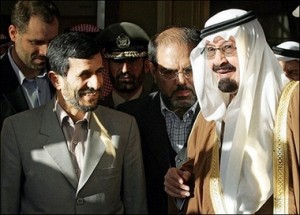Rivalries between Iran and Saudi Arabia date back to the first Pahlavi monarch. Following the Islamic Revolution in the 1980s, Iraq waged war against Iran with the obvious support of the Saudis. At that time, tension in the bilateral relations was high.
Tensions decreased in the following two decades, but it seems that political rivalries between these regional players has entered a new phase following 9/11 terror attacks and the occupation of Iraq.
There are three main areas of competition between Tehran and Riyadh after 2003, which include Iraq, Palestine and Lebanon, and the Persian Gulf.
Areas of rivalry between Iran and Saudi Arabia
The Iraqi Baath party controlled Iraq for decades and posed a threat to the entire region, but the Saudis considered them a counterweight to Iran’s regional influence. Following the invasion of Iraq and the collapse of Baathist rule, new conditions were created. The shiites enjoyed a special position in the new political system because of democracy and the fact that they were the majority inside the country.
The Saudis could never accept the shia ascension to power. Therefore, Riyadh took a negative approach towards the new Iraqi government. Saudi officials believed that if the new relations between Iran and Iraq became powerful enough, the balance of regional power would be disturbed to their detriment. Therefore, they held a negative view of the Iraqi government and have never offered firm political support for the new government in Baghdad.
As for Lebanon and Palestine, new developments have quickly unraveled. In Saudi Arabia’s view, those developments both in were influenced by Iran and Riyadh spared no effort to thwart that influence. The war between the Hezbollah and Israel broke out in 2006 and was followed by the invasion of Gaza in 2008. The end result was the strengthening of the resistance axis. In the meantime, Saudi Arabia conducted clandestine efforts both in Lebanon and Palestine to undermine Iran’s role and influence.
The third area of rivalry, which is geographically closer to both countries and more sensitive, is the Persian Gulf. During the past few decades, Iran and Saudi Arabia have taken different approaches to the security arrangements in the Persian Gulf. While Iran has called for local security arrangements through the cooperation of regional players and opposes the presence of transregional powers like the United States, Saudi Arabia welcomed transregional powers to the Persian Gulf and signed various agreements allowing the establishment of new military bases in the region.
The crisis in Bahrain and Iran-Saudi rivalry
Given new developments and the popular uprisings, Bahrain has gained special prominence both for Iran and Saudi Arabia.
The small island is now an important arena in which Iran and Saudi Arabia are vying for control. Although popular uprisings in Bahrain against Al-Khalifa regime were natural result of the uprisings in Egypt and Tunisia, they were also rooted in the discriminatory policies adopted by the Bahraini government towards the Shia.
The Al-Khalifa proved incapable of curbing the street protests and turned to the Saudis for assistance. More than 1,000 security forces arrived in Bahrain to suppress its people in collaboration with Bahrain’s own security forces. At present, Saudi Arabia plays an axial role among the Gulf Cooperation Council states and it seems that the recent espionage charges leveled against Iran by Kuwaiti government were a result of Saudi pressures.
The majority of Saudi Shias are concentrated along its eastern borders, which is close to Bahrain and is rich in oil reserves. Riyadh considers the collapse of the Al-Khalifa regime a red line. Saudi officials believe that regime change in Bahrain will increase Iran’s regional influence in the Persian Gulf. Bahrain’s uprising was a popular development with local causes, but the saudis talk about Iran’s influence in fostering unrest in Bahrain and try to depict it as a sectarian war. This policy aims to facilitate the suppression of people’s uprising while gaining regional and international support.
It seems that Saudi Arabia will continue to support the Al-Khalifa regime. Of course small concessions will be given to the Shia in Bahrain, but real reforms will not take place and the Al-Khalifa regime will remain in tact.
The way out
The crisis in Bahrain needs a broad-based solution which goes far beyond diplomatic relations between Iran and Saudi Arabia. It seems that both regional and international mechanisms are needed to manage the crisis. Such mechanisms may involve Turkey, Qatar, and even the European Union. Therefore, to reduce the tension a broad-based mechanism is required.
By Dr. Ali Akbar Asadi, Researcher; Center for Strategic Research


















